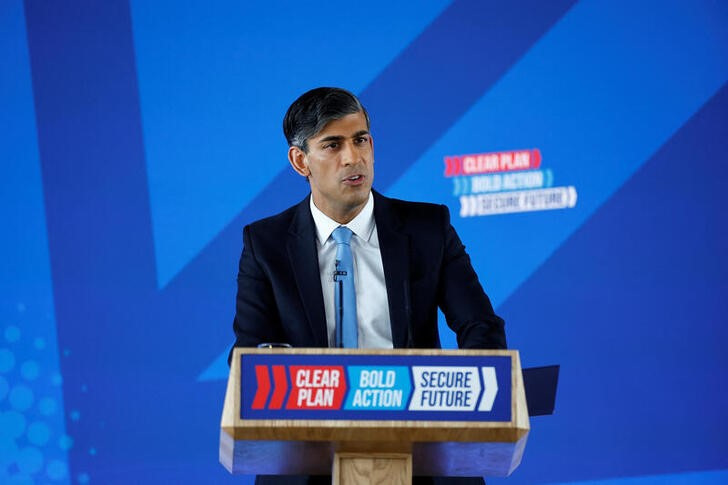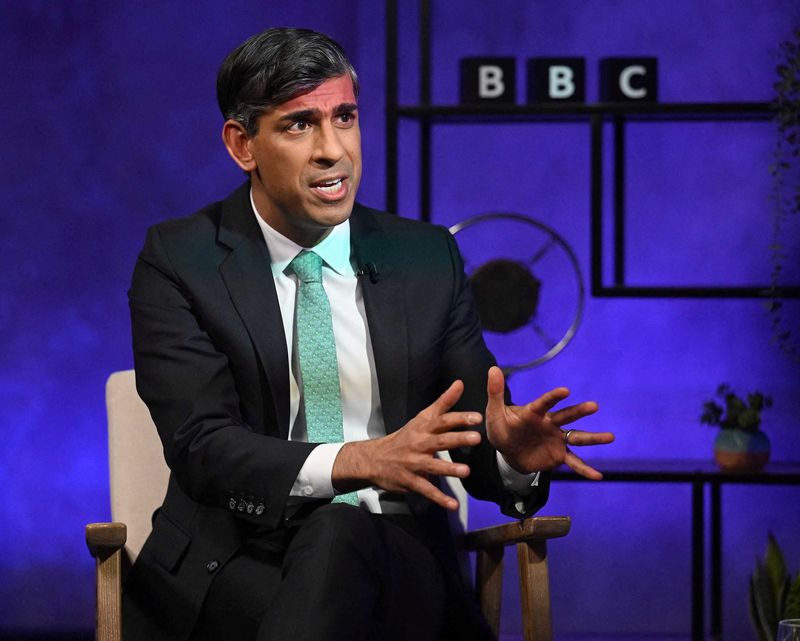By Elizabeth Piper and Alistair Smout
SILVERSTONE, England (Reuters) -Prime Minister Rishi Sunak pledged to cut 17 billion pounds ($21.7 billion) of taxes for working people if re-elected, in a final throw of the dice to overturn polls that put him on course for a heavy defeat in Britain's July 4 election.
With his Conservative Party consistently about 20 points behind Keir Starmer's opposition Labour in the polls, Sunak made a new appeal on Tuesday to what one Conservative lawmaker described as Britain's carpenters, bricklayers and electricians, by promising further tax cuts if they give him their vote.
The party manifesto aims to put tax cuts at the heart of the campaign, with Sunak's team believing that the move will put pressure on Labour, traditionally seen as the party of tax and spend. Starmer has said his party will not lift the main taxes.
Sunak, a 44-year-old former investment banker, acknowledged that people were frustrated with him and his party after 14 years of power, dominated at times by political turmoil and scandal, during which many have struggled to make ends meet.
The twin shocks of the COVID pandemic and energy price spikes have sent consumer prices up 21% in three years, the tax burden has risen to its highest as a share of the economy since just after World War Two, and failing public services have created a sense of malaise.
But Sunak argued that the economy was finally recovering and if re-elected he would cut payroll taxes for workers to reignite economic growth further.
"I'm not blind to the fact that people are frustrated with our party and frustrated with me," he said at the launch of the Conservatives' manifesto, setting out its future policy pledges.
"Things have not always been easy, and we have not got everything right, but we are the only party in this election with the big ideas to make our country a better place to live."
TAX PROMISE
Under the plan launched on Tuesday at the Formula One racetrack Silverstone in central England, Sunak said taxes would be cut by 17.2 billion pounds a year by 2029/30.
That will be funded by an annual 12-billion-pound cut to welfare spending and 6 billion pounds a year of savings by tackling tax avoidance and evasion.
The biggest tax cut - accounting for 10 billion pounds of the 17-billion-pound reduction planned - is a 2-percentage-point cut in the rate of National Insurance paid by employees, which will take effect by April 2027.
In the past, promises to cut the welfare bill by similar amounts took longer than planned.
Labour described the manifesto as "a desperate wish list of unfunded policies" and drew parallels with Sunak's predecessor Liz Truss, whose economic policies led to higher borrowing costs and mortgage rate rises.
"This is a recipe for five more years of Tory chaos, which will leave the British people paying the price," said Labour's would-be finance minister Rachel Reeves.
Paul Johnson, director of the Institute for Fiscal Studies, described the tax cuts as "giveaways paid for by uncertain, unspecific and apparently victimless savings."
"Forgive a degree of scepticism," he said.
As part of the pledges, Sunak said he would help the self-employed by abolishing their main National Insurance rate by the end of the next parliament, a possible boost to 4.3 million people who make up around 13% of all employment.
But so far, Sunak's message has failed to dent the Labour lead. Some polls show many voters want change and greater investment in public services rather than tax cuts, which they have yet to feel the benefit from.
Others are still grappling with the fallout from Truss's chaotic tenure.
The Conservatives also now face a challenge from the right-wing Reform UK party, which, under the leadership of Brexit campaigner Nigel Farage, has vowed to lead a "revolt" against the Conservatives.

Labour will launch its manifesto on Thursday.
($1 = 0.7852 pounds)
